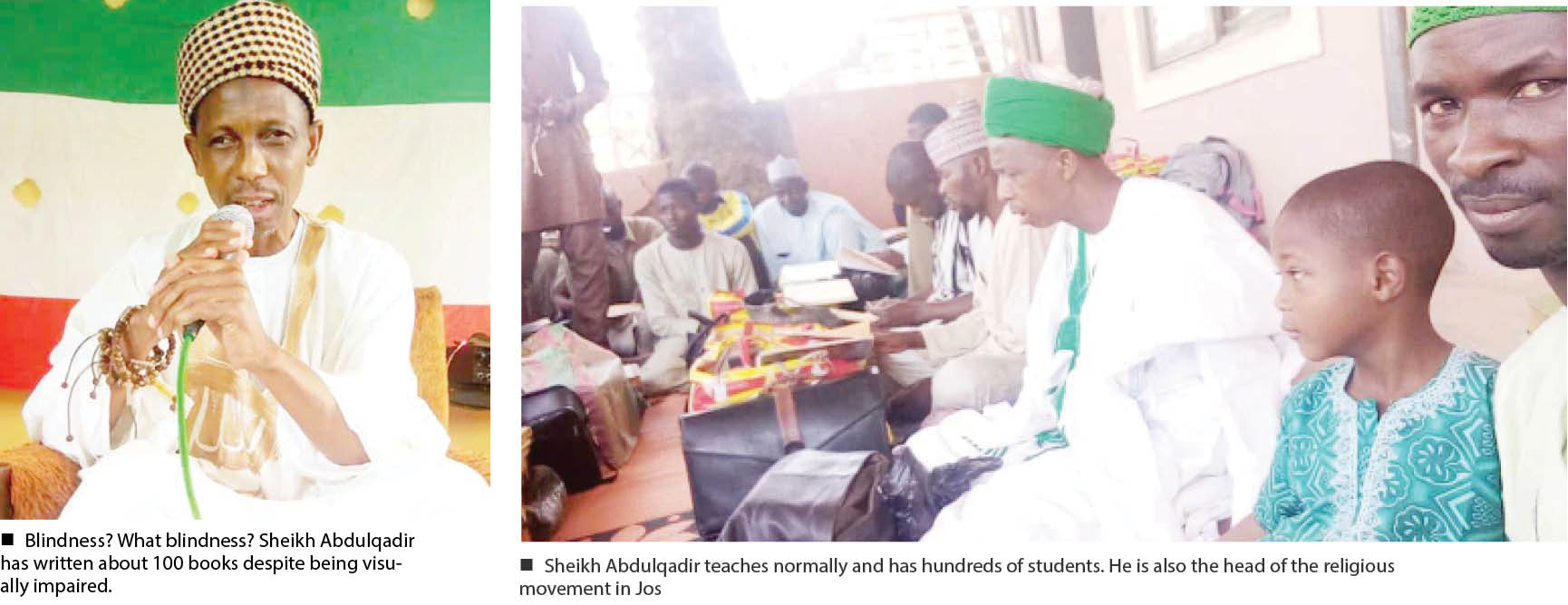Sheikh Abdulqadir Mu’azu was struck with blindness at his prime when he was in his mid-20s but despite his disability has managed to write dozens of books and teachers thousand of students in his school.
His ability to write, or correct written text has left many baffled.
At 55, Sheikh Abdulqadir Mu’azu has been blind for more than half his life. He lost his sight over two years, while he was between the ages of 25 and 26, but three decades later, he has about a thousand people sitting at his foot to learn and has written about 100 books.
His blindness or his special abilities are not strange to Sheikh Abdulqadir who said it was all “normal” and part of his destiny.
“I didn’t lose sight instantly,” the Jos-based cleric told Daily Trust. “The problem kept developing day by day before I eventually lost my sight but that isn’t strange to me. I completely lost sight when I was intensifying my quest for advanced Islamic and Western knowledge to fulfil my ambition,” he said.
His ambition then was to be a teacher and he would not let blindness stop him. He pushed on to complete his studies.
“I strived to pursue knowledge both within and outside Plateau State,” he said. “I went as far as Kano State, which was after I got blind, to ensure that I obtained more advanced knowledge that would be beneficial to the larger society.”
Over the years, the society has found his knowledge useful as every day, hundreds of Jos residents gather at his feet for their studies in Islamic knowledge. He teaches various Islamic texts and boasts of having graduated policemen, soldiers and lecturers from his school. Every day, he attends to about 15 sangaya schools of various categories of students.
Despite his blindness, Sheikh Abdulqadir goes to class and makes use of the blackboard. His ability to write has surprised many people, including his students. He does not only write when teaching, but he has authored dozens of books on poetry, Qur’an exegesis (tafsir), Arabic grammar and more. His flair for writing predates his blindness.
“I developed a fondness for writing right from my youth and that is why even when I became blind, writing books is not strange to me. I have written more than 100 books so far. Many have been published while some not yet,” he said.
His writing process, he says, vary, where sometimes he relies on himself, other times he adapts.
“Whenever I conceive an idea, I compose it myself. Sometime, I dictate to someone to write for me just as a person with sight would do if he doesn’t want to use his or her hands and write. I equally teach students in classrooms like a normal teacher,” he said.
He is so adept at this that he even detects and correct errors from oral readings rendered to him. Sheikh Abdulqadir believes these attributes are gifts from God.
“To me, knowledge is light in the heart of people. It is not determined by your ability to see and that is why even when your eyes are closed, you could still write and detect errors made by someone who can see because what he would say or write is read from the heart. So, if God lightens your heart, whether you are blind or not, you will write or read well like a person with sight,” he said. “The Almighty took away my sight and gave me other qualities such as the ability to acquire knowledge, teach and even preach His gospel without sight.”
His passion for teaching saw him build a school, which presently is closed because of the COVID-19 pandemic.
Over the 30 years of his blindness, Sheikh Abdulqadir has adjusted to his circumstances that he believes the loss of one organ should not define him or any other person as that is destiny. He feels “normal” he said, and does things that have defied people with sight.
“I believe that there is no difference in the pattern of life between now and before. Life is the same,” he said. “To me, if you believe that losing any of your sense organs is destiny, you don’t see any difference between the time you could see and when you become visually disabled.”
Contrary to the projections of blind or disabled people as poor and beggarly, Sheikh Abdulqadir preaches self-sufficiency. He has been able to take care of his needs and his family through his business of selling books.
“I have never had problems of clothing or feeding my family. I have been living well,” he said. He is doing well enough that he does not see the need for religious leaders to rely on the resources of their congregants to feed and take care of their needs as they could run businesses from which they could earn a livelihood.
“Despite being an imam and leader of the Qadariyya Sufi movement in Plateau State, I run a daily business that sustains my family. I sell books mostly written in Arabic. I don’t believe in living without a business because of my position as a religious leader,” he said, “When you wait for people to give you, you will lose their respect and will have a mind that may not stick to the truth.”
One of his greatest accomplishment, he said, was fulfilling his father’s dream of building a mosque.
“Before I turned blind, our father had said his major ambition was to build a mosque before he died. To actualise his long-time ambition, he had to sell his land to see if he could build it but death intercepted,” he said.
Seeing how badly his father wanted to achieve this dream, Sheikh Abdulqadir put the resources at his disposal to achieve this dream. He also added a school, in which he now teaches. He takes great pride in saying that both the school and the mosque were built without taxing government or individuals.
For the preacher, other people with disabilities must understand that their circumstances may be challenging but giving up should not be an option. As for him, he is a fulfilled man living his dream in spite, not because, of his blindness. That is all there is to it.

 Join Daily Trust WhatsApp Community For Quick Access To News and Happenings Around You.
Join Daily Trust WhatsApp Community For Quick Access To News and Happenings Around You.


